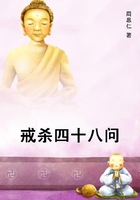"When he chooses," said he, "Handel strikes like the thunderbolt."Beethoven hailed him as "The monarch of the musical kingdom."When Beethoven was dying, one of his friends sent him a present of Handel's works, in forty volumes. They were brought into his chamber, and, gazing on them with reanimated eye, be exclaimed, pointing at them with his finger, "There--there is the truth!"Haydn not only recognised the genius of the great men who had passed away, but of his young contemporaries, Mozart and Beethoven. Small men may be envious of their fellows, but really great men seek out and love each other. Of Mozart, Haydn wrote "Ionly wish I could impress on every friend of music, and on great men in particular, the same depth of musical sympathy, and profound appreciation of Mozart's inimitable music, that I myself feel and enjoy; then nations would vie with each other to possess such a jewel within their frontiers. Prague ought not only to strive to retain this precious man, but also to remunerate him;for without this the history of a great genius is sad indeed....
It enrages me to think that the unparalleled Mozart is not yet engaged by some imperial or royal court. Forgive my excitement;but I love the man so dearly!"
Mozart was equally generous in his recognition of the merits of Haydn. "Sir," said he to a critic, speaking of the latter, "if you and I were both melted down together, we should not furnish materials for one Haydn." And when Mozart first heard Beethoven, he observed: "Listen to that young man; be assured that he will yet make a great name in the world."Buffon set Newton above all other philosophers, and admired him so highly that he had always his portrait before him while he sat at work. So Schiller looked up to Shakspeare, whom he studied reverently and zealously for years, until he became capable of comprehending nature at first-hand, and then his admiration became even more ardent than before.
Pitt was Canning's master and hero, whom he followed and admired with attachment and devotion. "To one man, while he lived," said Canning, "I was devoted with all my heart and all my soul. Since the death of Mr. Pitt I acknowledge no leader; my political allegiance lies buried in his grave." (11)A French physiologist, M. Roux, was occupied one day in lecturing to his pupils, when Sir Charles Bell, whose discoveries were even better known and more highly appreciated abroad than at home, strolled into his class-room. The professor, recognising his visitor, at once stopped his exposition, saying: "MESSIEURS, C'ESTASSEZ POUR AUJOURD'HUI, VOUS AVEZ VU SIR CHARLES BELL!"The first acquaintance with a great work of art has usually proved an important event in every young artist's life. When Correggio first gazed on Raphael's 'Saint Cecilia,' he felt within himself an awakened power, and exclaimed, "And I too am a painter" So Constable used to look back on his first sight of Claude's picture of 'Hagar,' as forming an epoch in his career. Sir George Beaumont's admiration of the same picture was such that he always took it with him in his carriage when he travelled from home.
The examples set by the great and good do not die; they continue to live and speak to all the generations that succeed them. It was very impressively observed by Mr. Disraeli, in the House of Commons, shortly after the death of Mr. Cobden:--"There is this consolation remaining to us, when we remember our unequalled and irreparable losses, that those great men are not altogether lost to us--that their words will often be quoted in this House--that their examples will often be referred to and appealed to, and that even their expressions will form part of our discussions and debates. There are now, I may say, some members of Parliament who, though they may not be present, are still members of this House--who are independent of dissolutions, of the caprices of constituencies, and even of the course of time. I think that Mr.
Cobden was one of those men."
It is the great lesson of biography to teach what man can be and can do at his best. It may thus give each man renewed strength and confidence. The humblest, in sight of even the greatest, may admire, and hope, and take courage. These great brothers of ours in blood and lineage, who live a universal life, still speak to us from their graves, and beckon us on in the paths which they have trod. Their example is still with us, to guide, to influence, and to direct us. For nobility of character is a perpetual bequest; living from age to age, and constantly tending to reproduce its like.
"The sage," say the Chinese, "is the instructor of a hundred ages.
When the manners of Loo are heard of, the stupid become intelligent, and the wavering determined." Thus the acted life of a good man continues to be a gospel of freedom and emancipation to all who succeed him:
"To live in hearts we leave behind, is not to die."The golden words that good men have uttered, the examples they have set, live through all time: they pass into the thoughts and hearts of their successors, help them on the road of life, and often console them in the hour of death. "And the most miserable or most painful of deaths," said Henry Marten, the Commonwealth man, who died in prison, "is as nothing compared with the memory of a well-spent life; and great alone is he who has earned the glorious privilege of bequeathing such a lesson and example to his successors!
NOTES.
(1) 'Letters of Sir Charles Bell,' p. 10.
(2) 'Autobiography of Mary Anne Schimmelpenninck,' p. 179.
(3) Dean Stanley's 'Life of Dr. Arnold,' i. 151 (Ed. 1858).
(4) Lord Cockburn's 'Memorials,' pp. 25-6.
(5) From a letter of Canon Moseley, read at a Memorial Meeting held shortly after the death of the late Lord Herbert of Lea.
(6) Izaak Walton's 'Life of George Herbert.'
(7) Stanley's 'Life and Letters of Dr. Arnold,' i. 33.
(8) Philip de Comines gives a curious illustration of the subservient, though enforced, imitation of Philip, Duke of Burgundy, by his courtiers. When that prince fell ill, and had his head shaved, he ordered that all his nobles, five hundred in number, should in like manner shave their heads; and one of them, Pierre de Hagenbach, to prove his devotion, no sooner caught sight of an unshaven nobleman, than he forthwith had him seized and carried off to the barber!--Philip de Comines (Bohn's Ed.), p. 243.
(9) 'Life,' i. 344.
(10) Introduction to 'The Principal Speeches and Addresses of H.R.H.
the Prince Consort,' p. 33.
(11) Speech at Liverpool, 1812.















